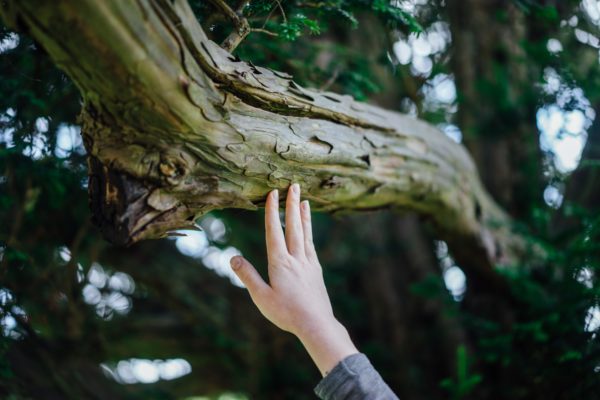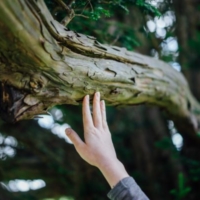Nature: the ultimate anti-depressant (+10 ideas to get you outside)
One of our family’s favorite spots is the Davis Mountains in West Texas, home to the second darkest night skies in the U.S. We love to go there for the magical starry nights where the Milky Way can easily be seen without a telescope and for the sparsely populated terrain and the vast wilderness. For years, we have made this annual digital detox a priority–we completely unplug and just hike, stargaze, sleep and read –because it brings us back to ourselves and to one another.

Nature opens me up to the now; to the present moment. It allows me to access wisdom and insights I never could have in my 24/7 modern life. I never cease to be amazed by the ideas and clarity that often bubble up after a weekend at the ocean or a day in the cool, dark woods.
Time in nature is often referred to as the ultimate antidepressant because it affects us physically, mentally and emotionally. Being outdoors alleviates stress, positively affects our mood/overall mental health, helps us to “reset,” promotes cognitive functioning, fosters problem solving and creativity, supports work/life balance, stimulates social interactions and helps family connection and intimacy.
The other night I met a small group of friends at a local river for a picnic dinner and swim. The river water was cool, refreshing and invigorating. Our nature date had an enormous impact on our moods and for a while, we all felt that everything was going to be OK.
Spending time in nature should be as natural and regular as breathing. Not something we save for a special occasion–but something that is built into our daily flow. And during this pandemic, it can be easy to be outside and social distance.
If it’s been years since you’ve spent time outdoors, or perhaps you feel out of your element chasing bears and mountain lions, consider the following 10 ideas to help “get thee outdoors!”:
•Team up. Ask your nature-loving friends for advice on local spots, and join them on their next excursion to discover hidden gems in your area. Maybe you even set up a weekly or monthly “nature date” with family or friends, and rotate which park or natural area you visit (let the kids choose!).
•Stay close to home. Get to know your own backyard, street, neighborhood park, streams/trails and any natural areas within walking distance. I recently learned about a spring off a hiking trail I have walked for years but never even knew about!
•Get campy. Dare yourself to go camping. This can be a wonderful experience for families; invite a group of friends to join you. Take it slow and easy: sleep in “camping cabins” or set up a tent in your own backyard!
•Plan a picnic. Pack a simple picnic of cold food, grab a blanket and head to your closest park; everyone loves the spontaneity of picnics on a weeknight or on a lazy Sunday evening!
•Make it a game. If hiking is no draw, play outdoor games like soccer, horseshoes, Wiffle ball, and Frisbee golf — or turn exploration into a competition: Who can spot the most squirrels, birds, or bats, or find the most unusual rocks, shells, or crystals?
•Grow your own grub. Explore container gardening and grow your own herbs and vegetables; who doesn’t love to grow their own food! Then visit a local farm (your local farmer’s market is a great place to get connected to nearby farms).
•Tune in to nature’s rhythms. Consider marking the full moon, new moon, or fall equinox with a hike, outdoor drum circle, or swim — we all love ritual, and it can be a fun, meaningful way to connect to nature ’s rhythms. Psst, I’m leading a fall equinox retreat this month!
•Create new habits. Make nature a daily or weekly habit. Head to a local park everyday at 6:00 p.m. to help you unwind before dinner, have your morning coffee on the back porch, or make it a point to see what birds are in your backyard during your lunch break. After dinner walks in your neighborhood are relaxing and help everyone prepare for good sleep.
•Tap local groups for help. Contact your state park office and ask about their family or outdoor programs. Also visit the websites for REI, the Sierra Club and the Children and Nature Network — founded by my friend Richard Louv, author of Last Child in the Woods — to learn about family-oriented events in your area. In Austin, I love Hill Country Outdoors.
•Be adventurous. Experience nature’s “wild side” and do something you’ve never done before! National parks are ideal for this, since they preserve our continent’s natural treasures and usually maintain accessible, family- friendly facilities. Or choose an “extreme” activity: go sea kayaking, stand-up paddle boarding, zip-lining, rock climbing, snowshoeing — any thing fun. Or consider swapping homes with another family in a natural area you’d like to visit; try using a service like www.homeexchange.com.
•Get creative. Don’t feel hemmed in by your urban or suburban home turf. Seek out all the green spaces you can find: botanical gardens, sculpture gardens, a rooftop garden, a neighbor’s outdoor space, a school playground, or even an open plaza or square where you can watch the birds and squirrels.
Merely getting outside at night in a place where you can see the stars — really see them in all their amazing vastness — is enough. The experience always reminds me of how small and inconsequential my worries are. Life is a mystery, not a thing to be managed. The healing power of nature recalibrates us and helps put things in perspective.
Nature is one of the greatest gifts we have available to us. In our galaxy, the sun is one of a hundred billion stars. Now how important is it to make sure you finish your laundry and your car gets washed again? Pick up a copy of my book Nurturing the Soul of Your Family: 10 Ways to Reconnect and Find Peace in Everyday Life to get more great ideas on how to immerse yourself (and your family) in the healing power of nature!
Seeking ways to stress-less and enhance your well-being? Here are some upcoming offerings to explore:

Subscribe here to Live Inside Out, a weekly blog written by life balance coach/speaker/author and stress management teacher Renée Peterson Trudeau. Passionate about helping men and women experience balance through the art/science of self-care, her work has appeared in The New York Times, Good Housekeeping, Spirituality & Health and more. Thousands of women in ten countries are becoming RTA-Certified Facilitators and leading/joining Personal Renewal Groups based on her award-winning self-care curriculum. She is the author of three books on life balance including the award-winning The Mother’s Guide to Self-Renewal. She lives in Austin, Texas, with her husband and 15-year-old son. More on her background here.



Comments are closed.